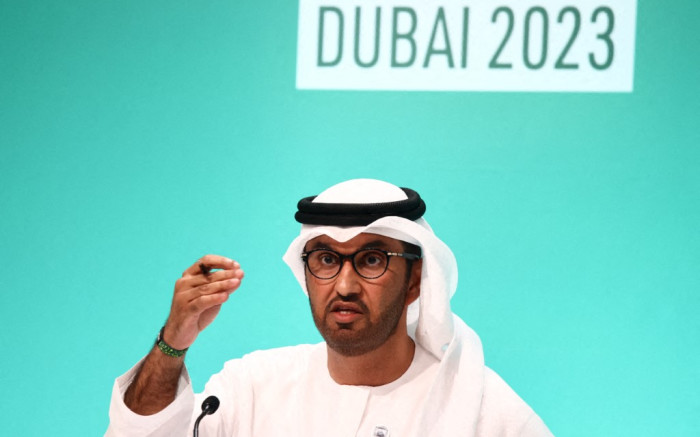
The president of the United Nations’ COP28 climate talks urged negotiators to compromise on Sunday, warning “failure is not an option” as efforts to reach a deal to phase out fossil fuels face opposition from leading oil exporter Saudi Arabia. Arabia.
COP28 President His Excellency Dr. Sultan Al Jaber during the opening press conference of the UN Climate Change Conference COP28 on November 30, 2023 in Dubai, United Arab Emirates. Image: Jakub Porzycki/NurPhoto via AFP
DUBAI – The president of the United Nations’ COP28 climate talks urged negotiators to compromise on Sunday, warning “failure is not an option” as efforts to reach a deal to phase out fossil fuels face opposition from the top oil exporter Saudi Arabia came across.
Less than 48 hours before Tuesday’s scheduled deadline, UAE COP28 chief Sultan Al Jaber said: “I want everyone to show flexibility to act urgently and find common ground.”
“It’s time for us to switch gears. It’s time for us to deliver,” he told reporters.
“We have to find a consensus”
Jaber organized a majlis – a traditional Gulf Arab meeting held in a circle with ministers to reach a compromise.
“Failure is not an option. What we strive for is the common good. What we seek is the well-being of everyone, everywhere,” he said before the meeting.
“We need to find consensus and common ground on fossil fuels, including coal,” Jaber added.
Germany’s chief negotiator had previously called on Jennifer Morgan Jaber, the UAE’s climate representative and head of the state oil company, to push for an ambitious agreement.
“There is an urgent need for action to keep the global pain threshold of 1.5 degrees within reach,” she said, referring to the target set in the 2015 Paris Agreement.
“The COP Presidency has reiterated on several occasions that it is here to facilitate an ambitious decision. This means there must be clear words on phasing out fossil fuels in line with 1.5°C.”
“Blockers in every phase”
Saudi Arabia, the world’s largest oil exporter, along with India, a major coal producer and consumer, are seen as the main opponents of attempts to phase out or phase out fossil fuels.
“I have been following Saudi Arabia in this process for over 30 years and they have been blockers at every stage,” said Alden Meyer, senior associate at climate think tank E3G.
“However, if the (COP28) Presidency and other countries manage to get China, India, Russia and others to move and accept some kind of language to phase out fossil fuels, the pressure on the Saudis will be overwhelming. “
A strong final deal also depends on wealthier nations pledging financial help to help emerging economies install more solar and wind technology and adapt to the impacts of climate change.
“It is clear that the least developed countries will not be able to advance at the same speed as the economic powers of the G20,” Morgan said.
“They have to meet development needs, but now they also have the opportunity to skip unsustainable decisions. That’s why we need a package that combines energy transition and energy access.”
‘DEEP CUTS’
United Nations Secretary-General Antonio Guterres kept up the pressure, urging delegates to agree on big emissions cuts and urging oil and gas companies to lead the energy transition.
“I call on fossil fuel companies to use their vast resources to lead the renewable energy revolution,” he said at the Doha Forum in Qatar.
“And I call on world leaders at COP28 in Dubai to agree on deep emissions cuts in line with the 1.5 degree target. This is not only the only path to climate sustainability, but also to economic sustainability.”
PRAYERS FROM THE POPE
In St. Peter’s Square in the Vatican, Pope Francis, who missed COP28 due to bronchitis, told his followers to pray for a good outcome in Dubai.
“I ask you to pray that we achieve good results to protect our common home and protect the population,” he said during his weekly public prayers.
“Almost not enough”
To add to the urgency, the International Energy Agency released an assessment showing that non-binding commitments made so far at COP28 by governments and oil and gas companies would fall far short of what is required.
The pledges – a tripling of renewable energy and a doubling of energy efficiency by 2030, as well as a drastic reduction in methane emissions by energy companies – would only reduce energy-related greenhouse gas emissions by 30% of demand by 2030, the IEA said.
“While the commitments are positive steps, they would be far from enough to put the world on track to achieving international climate goals, particularly the goal of limiting global warming to 1.5 degrees Celsius,” it said it.






Recent Comments